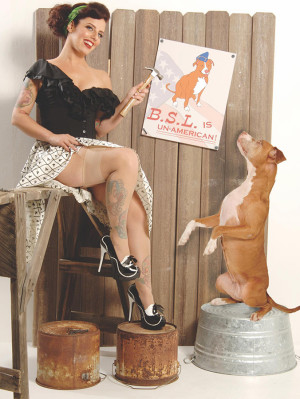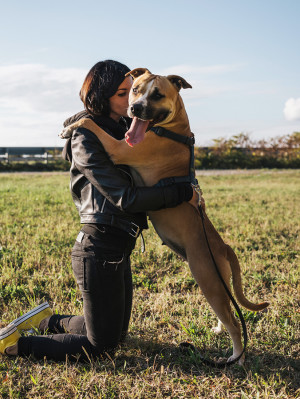This DC Bill Will Prevent Renters from Being Discriminated Against Because of Their Pets
If passed, it will mark progress in the fight against breed-specific legislation.

Share Article
On Wednesday, the Council of the District of Columbia announced a new, proposed billopens in a new tab, The Pets in Housing Amendment Act, which would secure affordable housing for pets in the Washington, D.C. area. Assembled by The Animal Welfare Project at the George Washington University Law School, the bill — if it passes — would ban restrictions and higher fees for pet parents of certain breeds of animals, cap pet fees at $25 per month, and limit pet security deposits at $300.
“Too often a person’s beloved companion and animal is a barrier to finding and staying in affordable housing here in D.C. So today, we’re trying to do something about that,” council-member Robert White said as he spokeopens in a new tab on the steps of the John A. Wilson building, where the council meets. He continued: “It’s common sense — but game-changing — updates to housing policy.”

Get (totally free) deals for food, treats, accessories, tech, and way more pet parenting must-haves.
opens in a new tabThe roadblocks to housing for pet parents
Unfortunately, a big barrier to getting a dog approved to live in a rental property is their breed, regardless of other factors, including behavior. Kailey McNeal, a law student at George Washington University, told DC News Nowopens in a new tab that she came up against challenges when trying to gain housing that would accept her Bulldog mix, Nakia.
“Most apartments that are pet friendly place restrictions on what type of dogs they can have based on the breed and size for the animal,” she said. “My landlord didn’t care what she looked like, if she was aggressive or potty trained opens in a new tabor destructive. All that mattered was if her paperwork named her as a dangerous breed.”
Fortunately, McNeal was able to move into her apartment with Nakia, but these types of stories don’t always end quite so happily. The bill, which could change all of that for Washington residents, still requires a vote by the council.
A history of breed discrimination in the U.S.
McNeal’s experience is hardly an outlier. As we’ve reported in the pastopens in a new tab, at least a dozen breeds and their mixes are commonly found on insurance companies’ and landlords’ “prohibited” lists. These restrictions disproportionately affect communities of color — particularly Black communities. In Harvard Law School Legislative Policy Fellow Ann Linder’s 2018 reportopens in a new tab, “The Black Man’s Dog,” Linder notes that keeping certain breeds from rental housing is “a new form of redlining to keep minorities out of majority-white neighborhoods.”
Adam Goldfarb, the former director of Humane Society of the United States (HSUS)’s Pets at Risk program, told us that renters, like McNeal, run up against this roadblock more than homeowners: “It’s harder for renters since they don’t control the insurance used by the rental property.”
Per the 2023-2024 surveyopens in a new tab by the American Pet Products Association, 66 percent of U.S. households have a pet (that translates to 86.9 million households). Pit Bull-type dogs (Pit Bull is not a breed)opens in a new tab are often at the top of every list, because of the harmful stereotype the breed type has received over the yearsopens in a new tab from popular culture and the media.
The list of commonly restricted breeds includes but is not limited to Terriers and Bull Dogs (Pit Bull-type dogs and mixes), Alaskan Malamutes, Boxers, Chow Chows, German Shepherds, Great Danes, Dalmatians, and wolf hybrids.
Breed-specific legislation (BSL) is opposed byopens in a new tab the American Veterinary Medical Association (AVMA), the American Veterinary Society of Animal Behavior opens in a new tab(AVSAB), the National Animal Control Association opens in a new tab(NACA), and many other animal-welfare organizations.
Per the National Association of Insurance Commissioners (NAIC), 73 municipalities across the United States have repealed their BSL. Some U.S. governors, including Florida’s Ron DeSantisopens in a new tab and New York’s Kathy Hochulopens in a new tab, have also taken steps to end breed discrimination for housing in their states.
A 2022 studyopens in a new tab found that 70 percent of participants opposed breed bans and supported education around breed-specific and animal behavior. Hopefully, more proposed legislation, like this Washington bill, will only help to increase awareness and spark further change.

Hilary Weaver
Hilary Weaver is the senior editor at Kinship. She has previously been an editor at The Spruce Pets, ELLE, and The Cut. She was a staff writer at Vanity Fair from 2016 to 2019, and her work has been featured in Esquire, Refinery 29, BuzzFeed, Parade, and more. She lives with her herding pups, Georgie and Charlie.
Related articles
![A redheaded woman in a black hat and sunglasses holding her pug dog under her arm as well as two boarding passes and her passport in an airport hallway]() opens in a new tab
opens in a new tab10 Places Where Your ESA Is — and Is Not — Allowed
Not every public place allows ESAs — but there are ways to advocate for yourself and your needs when your pup or other ESA is not on the guest list.
![restricted breed Staffordshire Bull Terrier stands in doorway of apartment rental]() opens in a new tab
opens in a new tabWhy (Certain) Dog Breeds Are Not Allowed and How to Prepare For a Move With One
Insurance companies’ breed-restriction lists take a bite out of housing options
![My Pit Bull is Family]() opens in a new tab
opens in a new tab“My Pit Bull is Family” Fights For the Big Little Guys
The fair-housing org’s journey from bumper stickers to databases.
![Deirdre Franklin dressed as a pinup model holding one of her calendars while sitting on a wooden table next to a Pitbull dog sitting on its hind legs looking up at her]() opens in a new tab
opens in a new tabPinups for Pitbulls Rolls Up the Victory Curls For the Pups Who Need It Most
Back in the day, pinup models donned their victory rolls to boost wartime spirits. Now, they do it to advocate for a much-maligned dog breed. Deirdre Franklin, the founder of Pinups for Pitbulls, explains how a burlesque hobby evolved into a life-saving non-profit.
![tripod dog / dog with three legs]() opens in a new tab
opens in a new tabWhy You Should Adopt a “Less Adoptable” Dog
Here’s why you shouldn’t rule out senior dogs, special-needs pups, bully breeds, or tripods.
![A woman embraces her American Staffordshire terrier dog outdoor in the backyard.]() opens in a new tab
opens in a new tab7 Myths Harmful to Pit Bulls—Debunked
These sweet pups need advocates, this National Pit Bull Awareness Month, and always.







